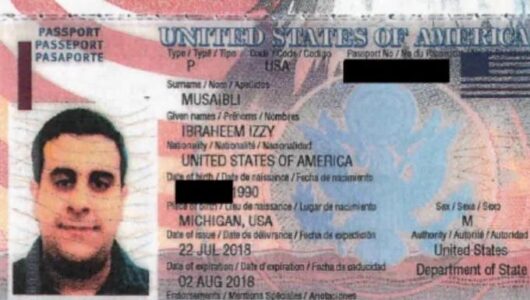
Jury finds Michigan man guilty of supporting ISIS
Eight years ago, Ibraheem Izzy Musaibli traveled to the Middle East and joined ISIS, one of thousands from around the world who joined the militant group’s efforts to establish a caliphate, according to federal prosecutors.
Now, the 32-year-old Dearborn man faces prison time after a jury convicted him Monday of three counts of supporting the Islamic State group and training with members from 2015 to 2018. He’s scheduled to be sentenced May 11, facing up to 50 years in prison.
“Ibraheem Musaibli traveled halfway around the world and joined a vicious, brutal, and violent terrorist organization known — and proud of — its barbaric acts of terror,” U.S. Attorney Dawn Ison for the Eastern District of Michigan said in a statement.
Musaibli’s attorney, John Shea, did not return an email Tuesday seeking comment. In earlier court filings, Musaibli’s attorneys claimed that an FBI special agent who handled his case was coercive and that he was brutally abused by Syrian Democratic Forces (SDF), a group sometimes allied with the U.S, to which he said the FBI told him to surrender.
“By late October or early November 2015, the defendant had joined ISIS in Raqqa, Syria: ISIS’s self-proclaimed capital,” prosecutors wrote. “Musaibli joined the terrorist group ISIS and lived in the Islamic State for more than two and a half years. He trained with them. He fought with them. He pledged allegiance to them. He recruited for them. He propagandized for them.”
At one point, “ISIS assigned Musaibli to a military brigade and issued him a Kalashnikov assault rifle, a vest, magazines, and grenades,” wrote assistant U.S. Attorneys in the 2021 court filing “The defendant went with other ISIS members of his military brigade, armed with Kalashnikov assault rifles, grenades, and RPGs, to Hit, Iraq. There, Musaibli fought alongside other ISIS members as they tried to protect Hit from the advancing Coalition Forces. Musaibli engaged in combat in other areas.”
The trial before U.S. District Judge David Lawson lasted nine days. The jury deliberated for about four hours, the U.S. Attorney’s Office said.
During the case, Musaibli’s attorneys criticized the actions of FBI Special Agent Wendy Kerner, who handled the case and communicated with him by text messages starting in April 2018. Musaibli was trying to leave ISIS around that time, prosecutors said.
“By early 2018, Musaibli sought to leave the Caliphate and return to Yemen,” prosecutors wrote. “Fornearly six weeks, Musaibli communicated overtly with the FBI who repeatedly offered opportunities for Musaibli to return to the United States. During this same time frame, Musaibli frequently texted with his father who likewise encouraged Musaibli to return to America. But Musaibli refused. Instead, Musaibli attempted tobe smuggled out of Syria but was captured by the Syrian Democratic Forces.”
The Syrian Democratic Forces then handed him over to the FBI, who flew him back to the U.S.
Defense attorneys sought to throw out in court the text messages with the FBI and Musaibli’s comments he made to the FBI while being repatriated. But Judge Lawson denied their request in December 2021, a decision upheld by the Sixth Circuit Court of Appeals.
Assistant U.S. Attorneys Hank Moon and Michael Martin prosecuted the case, with help from the National Security Division’s Counterterrorism Section. The FBI’s Joint Terrorism Task Force investigated the case.
The three charges that Musaibli was convicted of were: providing material support to a terrorist organization; conspiracy to provide material support to a foreign terrorist organization; and receiving military-type training from a foreign terrorist organization.
Musaibli is one of 246 people in the U.S. who have been charged with crimes tied to ISIS since March 2014, eight of them in Michigan, according to the George Washington University’s Program on Extremism. Out of the 246, 198 have pled or been found guilty.
Source: yahoo





